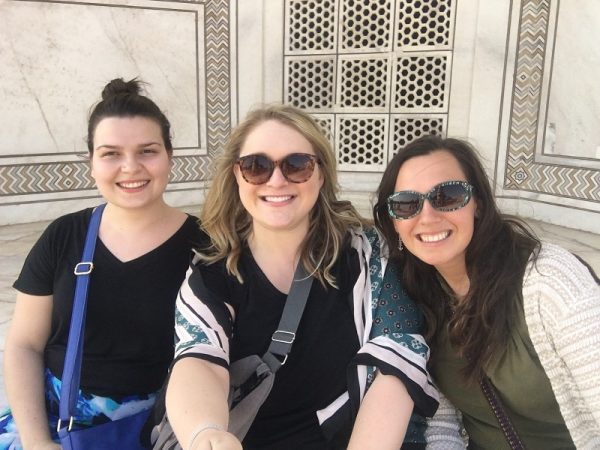Study Abroad in India

Over Spring Break 2017, three MHA students embarked on a Study Abroad trip focused on Health and Wellbeing in India. Diana Kuzmich (l), Kendall Walsh (c), and Tracy Valero (r) departed Charlotte International Airport for a 10-day adventure to India studying its healthcare system, various NGOs, and culture. Prior to departure, the students selected a topic to explore while in India and to report back in the form of a presentation. Kendall and Tracy studied the gender inequality issues still prevalent in modern India and Diana studied air pollution.
While the trip was geared toward Public Health and Social Work, the professors, Drs. Beth Racine (PHS) and Shanti Kulkarni (SOWK), made sure that MHA students experienced a unique activity related to their roles in healthcare. They coordinated a private tour of the Emergency Department (ED) at the All India Institute for Medical Sciences (AIIMS) Hospital located in downtown New Delhi. Patients lined the streets of this enormous facility, hoping for the opportunity to see a healthcare provider. Wait times for appointments could take weeks or months. While waiting for an opportunity to be seen, patients and their families would set up camp and live outside the hospital walls until the day finally came when they could be seen.
Within the walls of the ED, sick patients lined the hallways and treatment rooms, offering little privacy. Despite all the chaos, the medical staff effused a calm sense of control. Upon admission, each patient was issued a triage color of green, yellow, or red. A green or yellow patient was unlikely to receive treatment until the condition escalated to red. At this point, the patient was relocated to a “red-zone” and treated. Medical records are kept in the bed with the patient at all times. Upon discharge, the information is transcribed into an electronic medical record. While the system appeared chaotic, the director reported it was very rare to ever mix up a patient, lose a record, or miss a transcription.
Overall, the students reported an unforgettable experience that gave each of them a new perspective on healthcare functioning in a foreign country. They came to appreciate how social work ends up encompassing health policy, public health, and facilitating health care delivery in a densely populated poverty stricken country like India. They were impressed in seeing health care professionals act as a team without any “this isn’t my job mentality.” Despite the unending clamor for their services, they were committed to compassionately helping as many people as possible.
Tracy noted, “This trip opened our eyes to the faults that can be seen even in Universal Health Systems, things are not always as they appear. India was a life-changing experience from both a social and healthcare perspective” Diana reflected, “I think what stands out the most to me, in terms of healthcare management in India, is the challenge of how to create a management system that is able accommodate the large population. The vast population coupled with the largely rural lifestyle was the most common challenge we heard from various healthcare workers. Currently effective NGOs are working on a community basis and branching out as they have the funds and support.” Kendall added, “The contrast in healthcare priorities between India and the United States was striking. While the issue of access is prevalent in both places, India focuses more on bringing healthcare to its populations, many of which live in healthcare deserts.” The students encourage as many MHA students as possible to take advantage of this unique opportunity in the future.